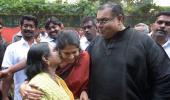The Delhi high court Friday admitted a Central Bureau of Investigation appeal against the acquittal of former telecom minister A Raja and 16 others in the 2G spectrum allocation scam case, paving the way for hearing in the matter six years after the plea was filed by the agency.

Admitting the Central Bureau of Investigation appeal, the high court said there are "some contradictions" in the trial court's judgment which require "deeper examination".
It granted the CBI "leave to appeal", saying the probe agency has made out arguable points.
"Leave to appeal" is a formal permission granted by a court to a party to challenge a decision in a higher court.
"The court on the basis of material on record, and after going through the sworn testimonies, material on record, impugned judgment and the submissions made at bar by both the parties has reached on an objective satisfaction that there is a prima facie case which requires deeper examination and re-appreciation/re-appraisal of entire evidence," Justice Dinesh Kumar Sharma said.
"The court during the hearing has also noticed some contradictions in the judgement itself, which requires deeper examination. The court at this stage is required to have a prima facie helicopter view. There may be a possibility that such contradictions are explained by the defence during the hearing," the court said in its verdict on the CBI's "leave to appeal".
The appeal was filed by the CBI in March 2018, but the aspect of 'leave to appeal' was heard by seven different judges before coming to Justice Sharma who reserved the verdict on March 14.
The special court had on December 21, 2017, acquitted Raja, DMK MP Kanimozhi and others in the CBI and ED cases related to the 2G scam.
On March 20, 2018, the CBI had approached the high court, challenging the special court's judgment.
The high court, in its 120-page verdict, said the State is the custodian of the rights of every citizen of India and in economic offence cases, the loss is not to a private individual but it trickles down to lakhs of innocent people of the country.
"If there has been an un-merited acquittal the scrutiny by the appellate court is the only available method to bring in correction wherever required. The appellate scrutiny cannot begin without the threshold of leave being granted," it said.
Justice Sharma said the 2G scam is not an ordinary criminal offence and is a case of different nature where criminal proceedings were initiated on the basis of the direction of the Supreme Court which had monitored the investigation.
The high court said the case pertains to economic offence which constitutes a separate class and required to be handled with a different approach and with little more sensitivity.
"The present case is not an ordinary case of murder, dacoity, rape, theft or fraud. It was a case where the allegations were extremely serious in nature.
Thus the appreciation of the evidence and handling of such cases has to be done in a very different manner," it said.
The high court said the counsel for the acquitted persons and firms have stated that though the prosecution witnesses did not support the case, the CBI did not declare them hostile and many of the points remained unexplained.
"The question before this court is whether by refusing leave to appeal such ambiguity should be buried without an opportunity to the State for giving an explanation for such. It may not be taken as giving an opportunity to the CBI to plug its loopholes. The duty of this court is to ensure that justice is not denied to anyone including the State on mere hyper- technicalities.
"The society has an expectation from the judicial dispensation system. Such faith or expectation cannot be permitted to be diluted by resorting to technical or unrealistic approaches," it said.
The high court said the trial court judge has repeatedly noted that CBI should have afforded an opportunity to the witness to explain the statement made by them.
This gives rise to the concern as to why the presiding judge did not exercise his jurisdiction under section 165 of the Indian Evidence Act to seek any clarity, if there was any ambiguity or obscurity, it said.
Section 165 of Indian Evidence Act deals with a judge's power to put questions or order production.
"The case of some of the accused persons cannot be segregated at this stage as the facts are so much interwoven with each other that it will be difficult to separate at this stage.... The evidence has to be weighed and not counted," it said.
Besides Raja and Kanimozhi, the special court had acquitted former telecom secretary Siddharth Behura, Raja's former private secretary R K Chandolia, Unitech Limited managing director Sanjay Chandra and three top executives of the Reliance Anil Dhirubhai Ambani Group -- Gautam Doshi, Surendra Pipara and Hari Nair -- in the 2G case lodged by the CBI.
Swan Telecom promoters Shahid Balwa and Vinod Goenka and the directors of Kusegaon Fruits and Vegetables Private Limited -- Asif Balwa and Rajiv Agarwal -- were also acquitted in the CBI case.
The special court had also acquitted Swan Telecom (Private) Limited, Unitech Wireless (Tamil Nadu) Limited, Reliance Telecom Limited, film producer Karim Morani and Kalaignar TV director Sharad Kumar in the CBI case.
They were tried under various provisions of the IPC and the Prevention of Corruption Act.
The CBI had alleged there was a loss of Rs 30,984 crore to the exchequer in allocation of licences for 2G spectrum which were scrapped by the top court on February 2, 2012.











 © 2025
© 2025